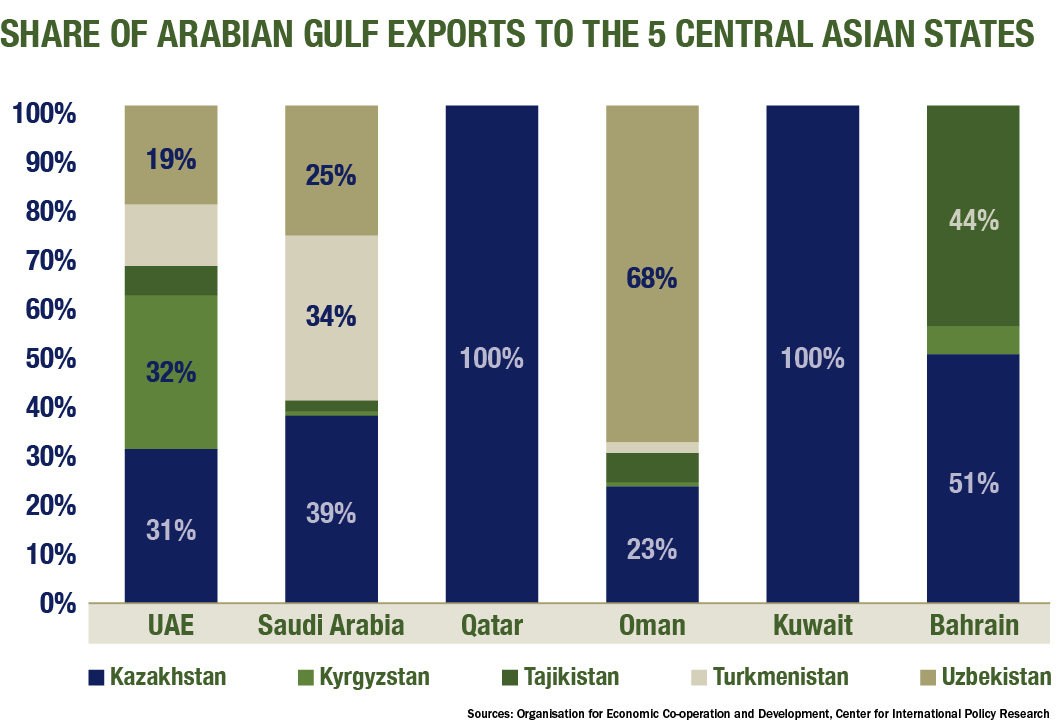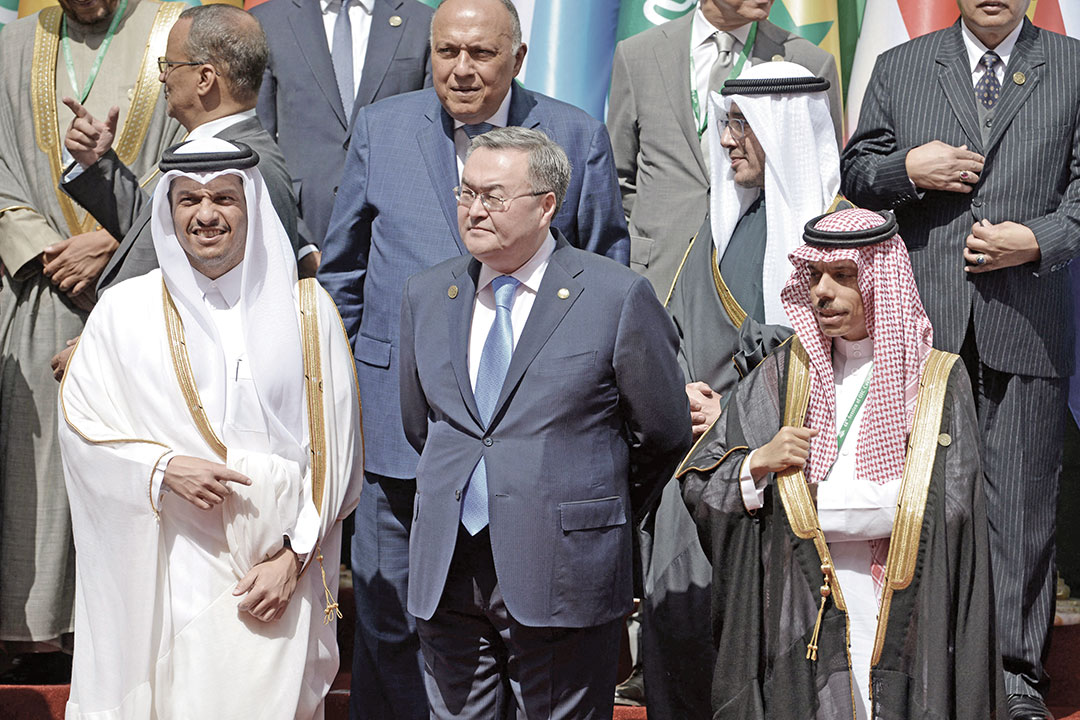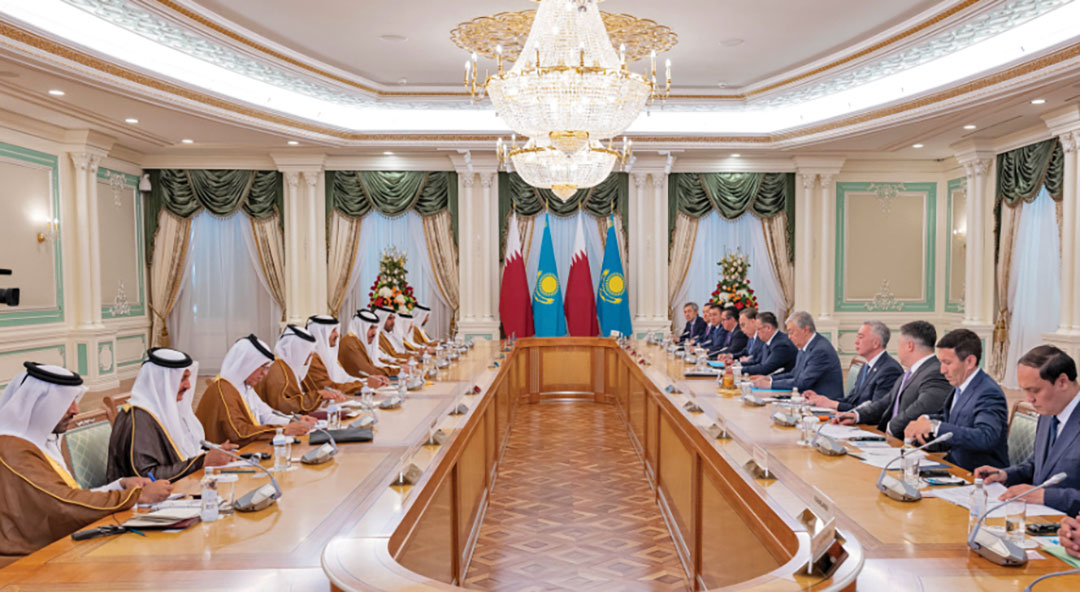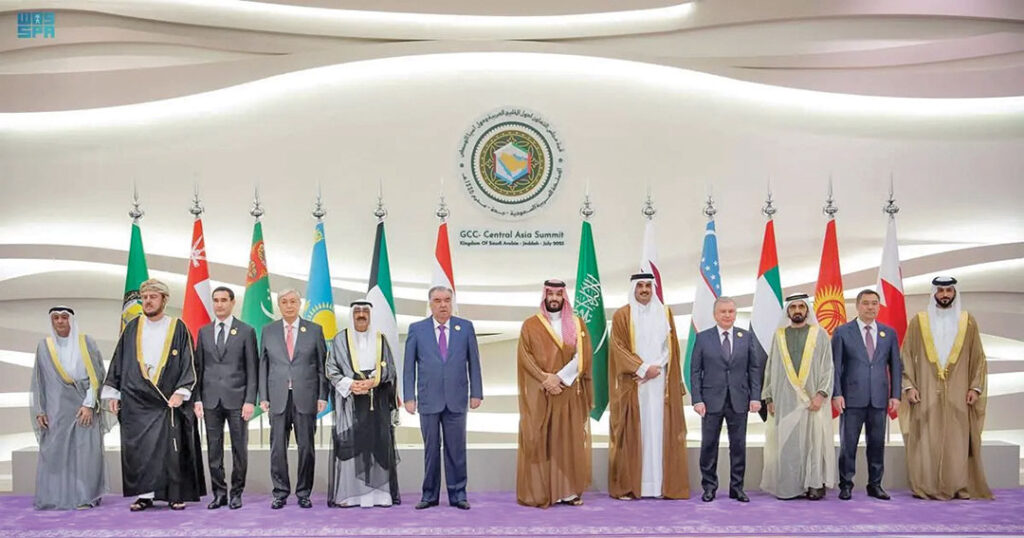A summit in Jeddah reinforces economic and cultural ties between the regions
UNIPATH STAFF
Central Asian nations established relations with Arabian Gulf countries shortly after the collapse of the Soviet Union. Initially centered around the energy trade, infrastructure development and economic ties, these connections have evolved to encompass political and diplomatic initiatives, as well as shared religious affinities. The relations between the two regions have developed significantly in the wake of Russia’s invasion of Ukraine in 2022.
The inaugural Gulf Cooperation Council-Central Asia summit, which took place in Jeddah, Saudi Arabia, in July 2023, marked a critical moment in this evolving partnership. Leaders of 11 countries, including Saudi Arabia, the United Arab Emirates (UAE), Qatar, Kuwait, Bahrain, and the five Central Asian states, participated in the summit.
Saudi Arabia initiated the summit to promote inter-regional economic cooperation, strengthen security ties, develop relations in the humanitarian sector and explore more areas of cooperation. The common cultural bonds shared by populations in both regions also served as a foundation for stronger multilateral cooperation. Led by His Royal Highness Crown Prince of Saudi Arabia Mohammed bin Salman Al Saud, the summit emphasized the importance of cooperation in addressing energy security and global production chain challenges.
The joint statement issued at the summit underscored strengthening strategic and political ties, expanding economic cooperation, boosting trade and investments, and cultivating closer cultural connections.
Uzbek Deputy Foreign Minister Bakhromjon Aloev described the summit as historic, highlighting its role in establishing a new form of inter-regional cooperation between Central Asia and the Gulf Cooperation Council (GCC) member states (Bahrain, Kuwait, Oman, Qatar, Saudi Arabia and the UAE).
 “Cooperation between the Central Asian countries and the GCC states is of strategic importance given the difficult international situation.” Aloev said.
“Cooperation between the Central Asian countries and the GCC states is of strategic importance given the difficult international situation.” Aloev said.
The next GCC-Central Asia summit, scheduled for Samarkand, Uzbekistan, further solidifies the commitment to advancing this cooperation.
The summit was a testament to stronger ties between the Gulf countries and Kazakhstan, Kyrgyzstan, Tajikistan, Turkmenistan and Uzbekistan. It was preceded by a September 7, 2022, official meeting of the foreign ministers of the Gulf and Central Asian states in Riyadh. They discussed the organization of a strategic dialogue between the regions. The ministers agreed to improve inter-regional cooperation across multiple areas, including restoring supply chains disrupted by the pandemic; bolstering food, energy and water security; promoting green energy; addressing environmental issues; and establishing trade and investment mechanisms.
This 2022 meeting led to the development of a joint action plan for strategic dialogue and cooperation between participating countries for 2023 through 2027. The 2023 Gulf-Central Asia summit has cemented the joint action plan and multilateral cooperation efforts.
Central Asia and GCC Relations
The roots of Central Asia-GCC relations trace back to historical and religious ties. The Soviet era kept these regions somewhat isolated because of the Cold War. However, the collapse of the USSR relieved the religious suppression suffered under Moscow’s rule, letting the region align more closely with the Middle East. The opening of borders after the collapse of the Soviet Union have not only attracted trade and investments but also revived cultural connections with Arab countries.
While inter-regional trade traditionally involved goods such as agricultural products, textiles and manufactured items, investments from the Gulf countries in Central Asia have primarily centered on energy since the mid-1990s. For example, the UAE’s sovereign wealth fund, Mubadala, has invested heavily in the development of energy infrastructure projects in the region, including a coal plant and a chemical factory in Kazakhstan.

Dubai-based companies have built transportation infrastructure in Kazakhstan and developed oil production in Turkmenistan. Saudi Arabia has finnacially supported Turkmenistan in building part of the Turkmenistan-Afghanistan-Pakistan-India (TAPI) pipeline, envisioned as a corridor for transporting Turkmen gas to India.
Cultural ties have also grown, fostering people-to-people exchanges. Nearly 50,000 Saudi tourists visit Kyrgyzstan and Uzbekistan annually. Mosques in Central Asia were restored and built with financial aid from Saudi organizations. A growing number of Central Asian Muslims go on pilgrimages to Mecca and Medina.
Desire for stronger ties
Saudi Arabia’s influence in Central Asia has extended beyond the cultural realm to commercial ties with local entrepreneurs. The growing cooperation between Central Asia and the GCC provides mutual economic benefits, enhances energy security for both regions, and promotes regional stability through diplomatic and security cooperation. With Russia’s geopolitical challenges and sanctions, Central Asia increasingly turns toward the GCC for opportunities.
The economic policies of Central Asian countries prioritize economic modernization and digital technologies. These topics were critical talking points of the Cholpon Ata meeting in Kyrgyzstan, which resulted in the regional Treaty of Friendship, signed by Kyrgyzstan, Uzbekistan and Kazakhstan. However, major modernization cannot happen without strong foreign capital. Central Asian leaders see GCC members, Saudi Arabia in particular, as attractive technological and investment partners.

Central Asian countries are drawn to Saudi Arabia’s Vision 2030 initiative. Mohammad Bin Salman’s commitment to a post-oil economy and investment in green technologies resonate with Central Asian aspirations. The region views Saudi Arabia’s innovations as an attractive development model. Central Asian leaders have been trying to attract more investments from Saudi Arabia since 2021.
Overall, the efforts to attract more foreign investors from the GCC region have intensified since the imposition of sanctions on Russian capital. Presidents of Uzbekistan, Kazakhstan and Turkmenistan paid official visits to Saudi Arabia to deepen economic ties with that country. All three leaders seek investments in regional natural gas pipelines and development of green energy projects.
As these partnerships continue to develop, Saudi Arabia and other GCC members stand to boost trade, improve access to resources and capitalize on the vast potential within Central Asian markets. The convergence of economic, technological and cultural interests signals the potential for a lasting and robust relationship between Central Asia and the GCC in the years ahead.

